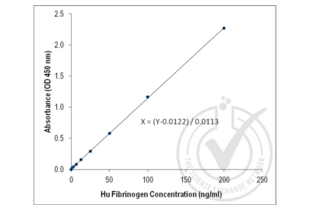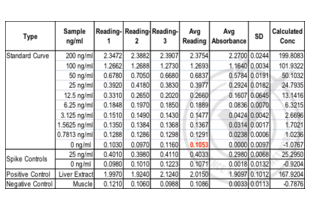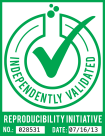Fibrinogen Antikörper
-
- Target Alle Fibrinogen Antikörper anzeigen
- Fibrinogen
-
Reaktivität
- Human, Ratte
-
Wirt
- Kaninchen
-
Klonalität
- Polyklonal
-
Konjugat
- Dieser Fibrinogen Antikörper ist unkonjugiert
-
Applikation
- ELISA, Immunohistochemistry (Paraffin-embedded Sections) (IHC (p)), Immunofluorescence (Paraffin-embedded Sections) (IF (p)), Immunohistochemistry (Frozen Sections) (IHC (fro)), Immunofluorescence (Cultured Cells) (IF (cc))
- Kreuzreaktivität
- Human, Ratte
- Homologie
- Mouse
- Aufreinigung
- Purified by Protein A.
- Immunogen
- Fibrinogen from human plasma
- Isotyp
- IgG
-
-
- Applikationshinweise
-
ELISA 1:500-1000
IHC-P 1:200-400
IHC-F 1:100-500
IF(IHC-P) 1:50-200
IF(IHC-F) 1:50-200
IF(ICC) 1:50-200 - Beschränkungen
- Nur für Forschungszwecke einsetzbar
-
- by
- Alamo Laboratories
- No.
- #028531
- Datum
- 16.07.2013
- Antigen
- Chargennummer
- 980680
- Validierte Anwendung
- ELISA
- Positivkontrolle
- Liver
- Negativkontrolle
- Skeletal muscle
- Bewertung
- Signal was detected in positive control samples but not in negative control samples.
- Primärantikörper
- Antibody: Fibrinogen antibody
- Catalog number: ABIN673854
- Batch number: 980680
- Sekundärantikörper
- Full Protocol
- A 96-well MICROLON® 600 96W High Binding 12 x 8 Clear Strip Microplate was coated with antigen by pipetting 100 µL of sample per well. All samples and standards were assayed in triplicate.
- The microplate was covered and incubated at 25°C overnight.
- After overnight coating, plate contents were discarded and wells were washed 3 times with 150 µL of 1 x PBST (PBS, 0.1% Tween-20) per well.
- Wells were then blocked with 250 µL of 1 x PBS / 0.05% Tween-20 / 1% BSA per well and incubated at 37°C for 2 h.
- After blocking, plate contents were discarded and wells were washed 3 times with 250 µL of 1 x PBS per well.
- 100 µL of primary antibody diluted 1:500 in 1 x PBS / 0.05% Tween-20 / 1% BSA was added per well and incubated at 37°C for 2 h.
- Plate contents were discarded and wells were washed 3 times with 200 µL of 1 x PBST per well.
- 100 µL of HRP conjugated secondary antibody diluted 1:10000 in 1 x PBS / 0.05% Tween-20 / 1% BSA was added per well and incubated at 37°C for 1 h.
- Plate contents were discarded and wells were washed 3 times with 200 µL of 1 x PBST per well.
- 100 µL of TMB (3,3', 5,5"-tetramethylbenzidine) substrate was added per well and incubated at 37°C for 10 min.
- 100 µL of STOP solution was added per well.
- The optical density (OD value) of each well was read using a microplate reader set to 450 nm.
- The triplicate readings for each sample were averaged and the average zero standard optical density subtracted. The corrected average-value was tabulated as Average Absorbance. A standard curve was generated by plotting the mean OD value for each standard on the y-axis against the concentration on the x-axis using Excel. A line of best fit through the points on the graph was used to generate the equation X = (Y-0.0122) / 0.0113.
- The equation X = (Y-0.0122) / 0.0113 was used to calculate fibrinogen concentrations of the samples based on their Average Absorbance values.
- Anmerkungen
- None
Validierung #028531 (ELISA)![Erfolgreich validiert 'Independent Validation' Siegel]()
![Erfolgreich validiert 'Independent Validation' Siegel]() Validierungsbilder
Validierungsbilder![Table 1: ELISA. Fibrinogen is present in the positive control sample (liver) and absent from the negative control (skeletal muscle) sample. Spike controls indicate no interference in absorbance readings from the protein lysate buffer used to prepare the positive and negative control samples. Absorbance readings (OD 450 nm) are shown for standard curve, spike controls and unknown positive (liver extract) and negative (skeletal muscle extract) control samples. Value for Average Reading is derived from the average of three readings (OD 450nm). The Average Reading for 0 ng/ml Standard was subtracted from all Average Readings to yield Average Absorbance values for Standards, spike controls and unknown positive (liver extract) and negative (skeletal muscle extract) control samples. Standard deviation is included for all samples. An equation (X = (Y - 0.0122) / 0.0113) was generated from the standard curve and used to calculate fibrinogen concentrations shown in the Table.]() Table 1: ELISA. Fibrinogen is present in the positive control sample (liver) and absent from the negative control (skeletal muscle) sample. Spike controls indicate no interference in absorbance readings from the protein lysate buffer used to prepare the positive and negative control samples. Absorbance readings (OD 450 nm) are shown for standard curve, spike controls and unknown positive (liver extract) and negative (skeletal muscle extract) control samples. Value for Average Reading is derived from the average of three readings (OD 450nm). The Average Reading for 0 ng/ml Standard was subtracted from all Average Readings to yield Average Absorbance values for Standards, spike controls and unknown positive (liver extract) and negative (skeletal muscle extract) control samples. Standard deviation is included for all samples. An equation (X = (Y - 0.0122) / 0.0113) was generated from the standard curve and used to calculate fibrinogen concentrations shown in the Table.
Protokoll
Table 1: ELISA. Fibrinogen is present in the positive control sample (liver) and absent from the negative control (skeletal muscle) sample. Spike controls indicate no interference in absorbance readings from the protein lysate buffer used to prepare the positive and negative control samples. Absorbance readings (OD 450 nm) are shown for standard curve, spike controls and unknown positive (liver extract) and negative (skeletal muscle extract) control samples. Value for Average Reading is derived from the average of three readings (OD 450nm). The Average Reading for 0 ng/ml Standard was subtracted from all Average Readings to yield Average Absorbance values for Standards, spike controls and unknown positive (liver extract) and negative (skeletal muscle extract) control samples. Standard deviation is included for all samples. An equation (X = (Y - 0.0122) / 0.0113) was generated from the standard curve and used to calculate fibrinogen concentrations shown in the Table.
Protokoll -
- Format
- Liquid
- Konzentration
- 1 μg/μL
- Buffer
- 0.01M TBS( pH 7.4) with 1 % BSA, 0.02 % Proclin300 and 50 % Glycerol.
- Konservierungsmittel
- ProClin
- Vorsichtsmaßnahmen
- This product contains ProClin: a POISONOUS AND HAZARDOUS SUBSTANCE, which should be handled by trained staff only.
- Lagerung
- 4 °C,-20 °C
- Informationen zur Lagerung
- Shipped at 4°C. Store at -20°C for one year. Avoid repeated freeze/thaw cycles.
- Haltbarkeit
- 12 months
-
-
: "Effect of the duration of UV irradiation on the anticoagulant properties of titanium dioxide films." in: ACS applied materials & interfaces, Vol. 7, Issue 7, pp. 4423-32, (2015) (PubMed).
: "The effect of full/partial UV-irradiation of TiO2 films on altering the behavior of fibrinogen and platelets." in: Colloids and surfaces. B, Biointerfaces, Vol. 122, pp. 709-18, (2014) (PubMed).
-
: "Effect of the duration of UV irradiation on the anticoagulant properties of titanium dioxide films." in: ACS applied materials & interfaces, Vol. 7, Issue 7, pp. 4423-32, (2015) (PubMed).
-
- Target
- Fibrinogen
- Abstract
- Fibrinogen Produkte
- Hintergrund
-
Synonyms: Fib2, Fibrinogen alpha chain, FGA
Background: Cleaved by the protease thrombin to yield monomers which, together with fibrinogen beta (FGB) and fibrinogen gamma (FGG), polymerize to form an insoluble fibrin matrix. Fibrin has a major function in hemostasis as one of the primary components of blood clots. In addition, functions during the early stages of wound repair to stabilize the lesion and guide cell migration during re-epithelialization. Was originally thought to be essential for platelet aggregation, based on in vitro studies using anticoagulated blood. However, subsequent studies have shown that it is not absolutely required for thrombus formation in vivo. Enhances expression of SELP in activated platelets via an ITGB3-dependent pathway. Maternal fibrinogen is essential for successful pregnancy. Fibrin deposition is also associated with infection, where it protects against IFNG-mediated hemorrhage. May also facilitate the immune response via both innate and T-cell mediated pathways.
- Gen-ID
- 2243
- UniProt
- P02671
-



 (2 Referenzen)
(2 Referenzen) (1 Validierung)
(1 Validierung)



